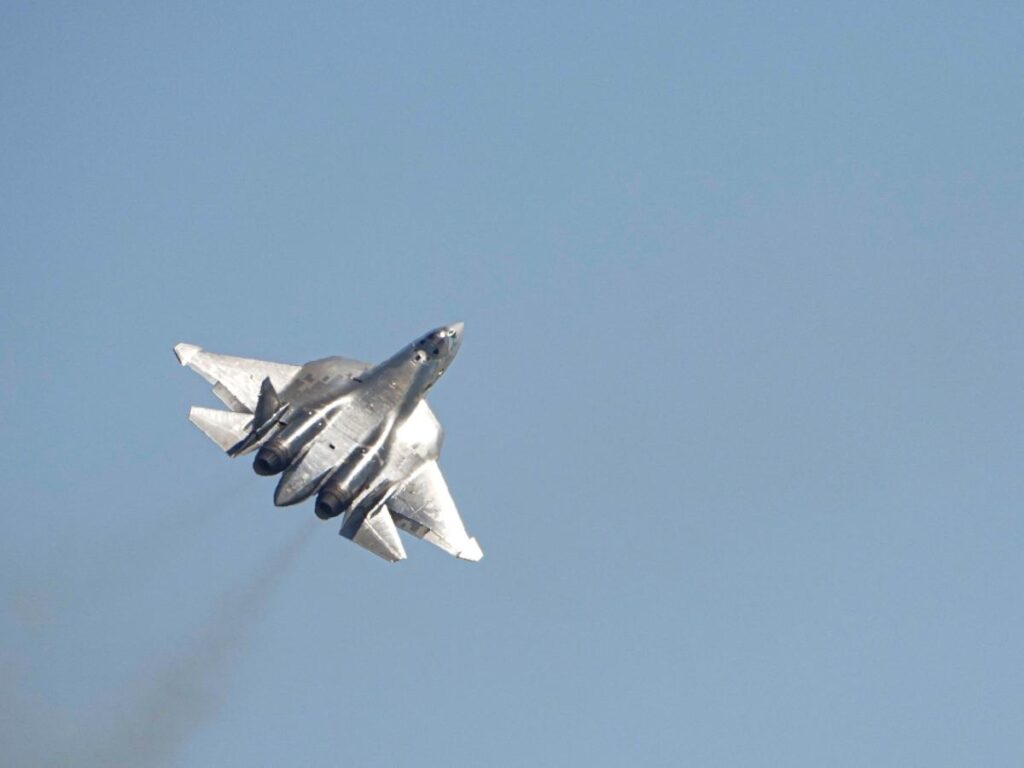-
According to a research group, Western sanctions have had an impact on Russia’s production of Su-57 fighter jets.
-
Frontelligence Insight told The Telegraph that Russia is unable to acquire some key components.
-
Russia has largely kept its Su-57s out of the war in Ukraine, fearing losses and reputational damage.
Western sanctions threaten Russia’s production of its prized Su-57 fighter jet, according to a research group.
Frontelligence Insight, an open-source research group with suspected ties to the Ukrainian military, said The Telegraph that Russia could no longer legally acquire key parts of its fifth-generation fighter plane due to Western sanctions.
Citing unspecified documents, it said the affected components included the WA36 silencer and the PLR7 60-12 and EA-PS 3150 power supplies, which are part of a German-made radar device used on the Su-57.
“It is clear that the Russian military industry is highly dependent on Western components, especially in the field of electronics,” the report said, adding that the sanctions have “endangered” Russia’s Su-57 production.
Bryden Spurling, a senior research leader at RAND Europe who focuses on defense and security, made a similar assessment.
“There is no doubt that Western sanctions are impacting Russia’s ability to develop its most advanced military systems,” Spurling told BI.
He added that a fifth-generation aircraft such as the Su-57 should theoretically give Russia “greater” situational awareness and more capabilities to successfully penetrate Ukrainian airspace, but that so far we have haven’t seen much evidence of it.
“That is an indicator that Russia is reluctant to risk the few Su-57s it has,” he said, adding that the aircraft’s impact on the war in Ukraine has so far been “negligible” and that this is likely to remain the case for the “foreseeable future.”
The Su-57 – known to NATO as ‘Felon’ – was delivered to the Moscow military in 2020, but only a very small number remain in its arsenal, and it is largely missing of the struggle in Ukraine.
The plane is built to… rival other countries’ fifth-generation fighter jets, including the American F-22 and F-35, which generally function stealth technologies, are highly maneuverable and have the latest sensors and weapons.
But Russia has mostly relied on it fourth generation aircraftsuch as the Su-30, Su-35 and Su-27, improved aircraft designs from the 1980s.
According to an intelligence report from 2023 update According to the British Ministry of Defense, Russia’s reluctance to deploy Su-57s over Ukraine indicates that the country is keen reputational damagethe loss of sensitive technologies and reduced export prospects that could occur if some were shot down.
Ukraine said it damaged one Su-57 a long-distance strike in June in the Astrakhan region of southern Russia, 360 miles from the front line.
That attack was a “major symbolic blow” to Moscow’s “long-troubled” Su-57 program. according to to Justin Bronk, an air force and technology expert at Britain’s Royal United Services Institute think tank – but not one with a direct effect on the war.
Echoing Frontelligence Insight’s assessment, he wrote that sanctions have complicated Russia’s efforts to obtain the avionics and microelectronics, which are key components of the Su-57’s cockpit.
Western sanctions and the war in Ukraine have damaged the Russian economy, but their exact impact is difficult to quantify.
In an opinion piece for Project Syndicate Earlier this month, Anders Åslund, a Swedish economist, said Western sanctions could wipe out as much as 3% of Russia’s GDP each year, which he said would be the equivalent of $56.4 billion a year.
Meanwhile, Alexandra Prokopenko, a fellow at the Carnegie Russia Eurasia Center, wrote in the Financial Times this week that Russia’s plan to boost its defense spending forced Putin to face an “irresolvable trilemma” of simultaneously maintaining a balanced financial system, meeting social obligations and maintaining defense levels expenditure at current levels.
But Jay Zagorsky, an economist and market professor at Boston University’s Questrom School of Business, had a different view.
He told BI last month that Russia’s massive military budget is supporting its sagging economy and that the invasion of Ukraine was probably the only thing keeping Russia from sliding into recession.
“If there was no war, oh yes, I think there would be an immediate recession,” he added.
Read the original article Business insider

